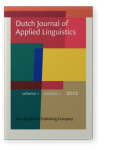Vol. 1:1 (2012) ► pp.143–149
Time scales in second language development
Development, and thus language development takes place at many interacting timescales, ranging from the milliseconds of lexical retrieval to pragmatic development at the scale of the life span. Different factors play a role in development at different time scales and even the same factor may play out differently at different time scales. Motivation in language learning may impact on long term intentions like a successful career, but also on short term motives like passing an examination. Such motivational drives interact, leading to a complex non-linear trajectory over time. There is hardly any research that looks at the same developmental process at different time scales and much of the research on second language development needs to be reconsidered on the basis of these insights.
Cited by (6)
Cited by 6 other publications
This list is based on CrossRef data as of 1 july 2024. Please note that it may not be complete. Sources presented here have been supplied by the respective publishers. Any errors therein should be reported to them.
